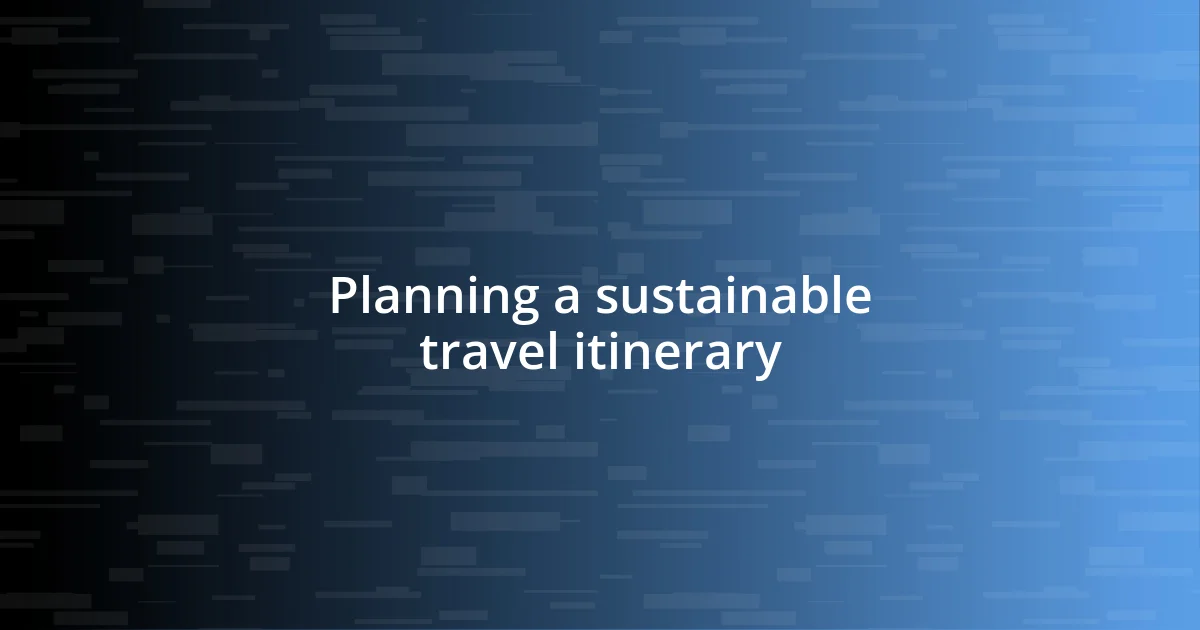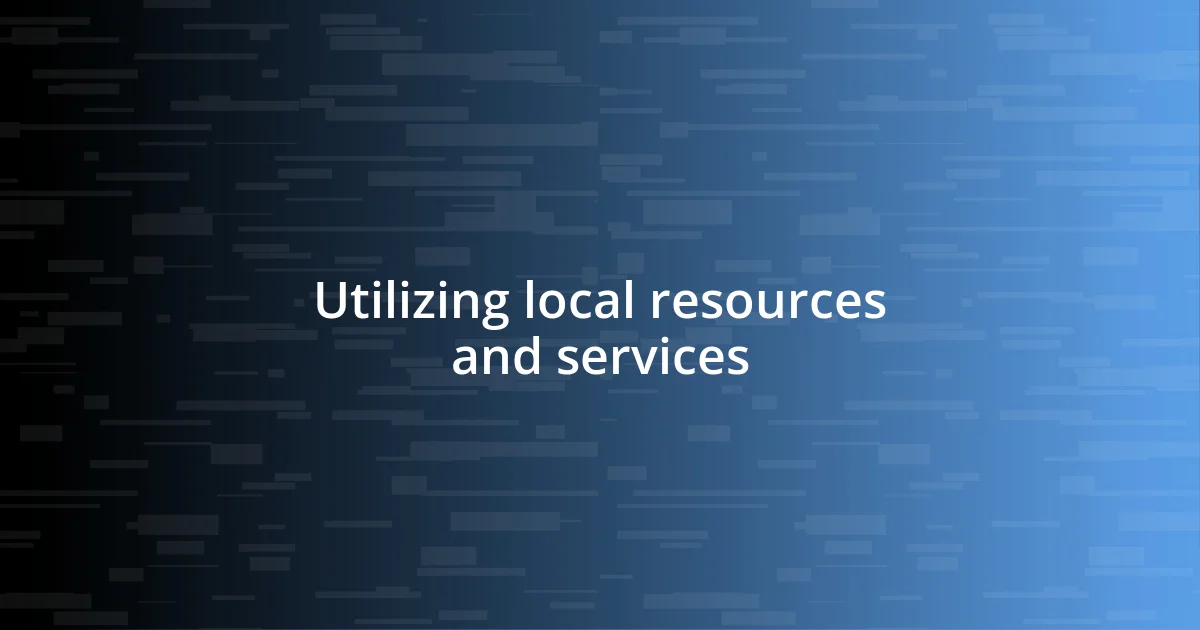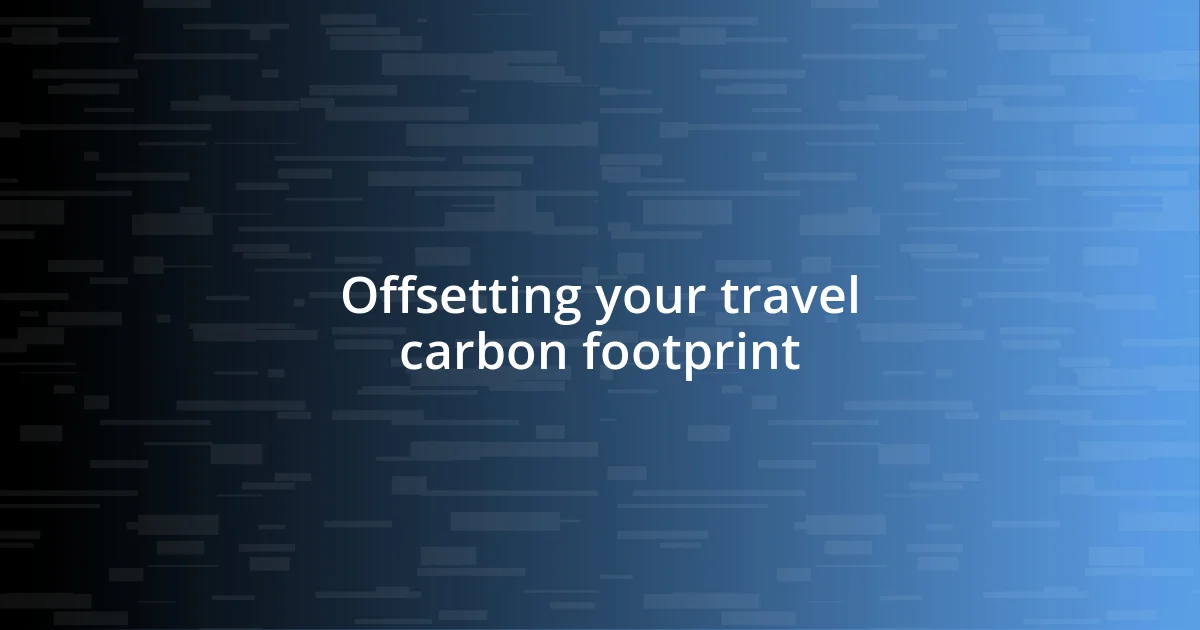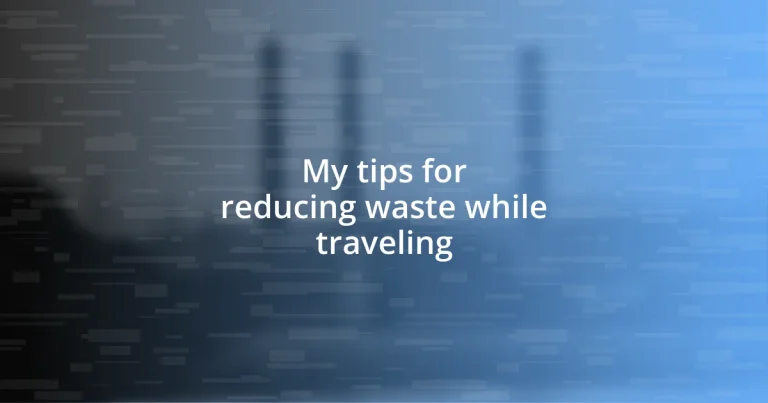Key takeaways:
- Reducing waste while traveling enhances personal experiences, connects with local cultures, and results in financial savings.
- Choosing eco-friendly accommodations and local transportation options significantly minimizes environmental impact and supports sustainability practices.
- Utilizing local resources, such as markets and eateries, alongside carbon offset programs, fosters a deeper connection to destinations and promotes responsible tourism.

Understanding waste reduction benefits
Reducing waste while traveling comes with a plethora of benefits, both for the planet and for our personal experiences. I remember a trip where I consciously chose to bring a reusable water bottle and a few cloth bags. The joy of not relying on single-use plastic, coupled with the pride of knowing I was making a positive impact, made that journey truly memorable. Have you ever stopped to think about how small changes in our habits can lead to significant outcomes for the environment?
Embracing waste reduction can also enhance your travel experience by allowing you to connect more deeply with local cultures. For example, during my travels in Italy, opting for local markets instead of packaged snacks opened up a world of delightful, fresh flavors. It’s about more than just cutting down trash; it’s about immersing ourselves in the travel experience. Doesn’t it feel more rewarding to enjoy a meal that’s sourced locally, rather than something wrapped in plastic?
Moreover, there’s a financial upside to reducing waste. When I began using refillable containers for toiletries and snacks while exploring, I noticed a substantial drop in my travel expenses. Suddenly, my budget had more flexibility for experiences rather than waste. Isn’t it fascinating how mindful choices can lead to both savings and a lighter footprint?

Planning a sustainable travel itinerary
When planning a sustainable travel itinerary, I prioritize destinations that are committed to eco-friendly practices. I remember choosing a small eco-village in Costa Rica that focuses on minimizing waste and promoting conservation. This not only enhanced my travel experience but also made me feel part of a larger movement toward environmental responsibility. Have you ever considered how your choice of accommodation can play a role in reducing waste?
Integrating local transportation into your plans can be an enjoyable way to cut down on carbon emissions. During a recent trip to Japan, I opted for the train system over renting a car. It was a delightful experience, soaking in the scenic views while reducing my impact on the environment. Plus, it allowed me to engage with locals, making my journey even more enriching. Doesn’t taking public transport sometimes feel like a hidden treasure while traveling?
Planning ahead also involves sourcing local eateries that prioritize organic and unpackaged foods. On a recent trip to a tiny fishing village, I discovered a little restaurant that served meals with ingredients sourced just a few steps from the kitchen. It was not just about enjoying a fresh catch, but also about supporting sustainable practices that lessen waste. How do you find dining options that align with your values while traveling?
| Factor | Impact on Sustainability |
|---|---|
| Accommodations | Choosing eco-friendly places can reduce waste and support the local economy. |
| Transportation | Using public transport or biking minimizes your carbon footprint. |
| Dining Choices | Eating locally reduces packaging waste and supports ethical practices. |

Choosing eco-friendly accommodation options
When searching for eco-friendly accommodation, I like to seek out places that prioritize sustainability. I once stayed in a small lodge that used solar panels for energy. The warmth of the staff and the natural surroundings made my stay not only comfortable but deeply fulfilling. There’s something inherently uplifting about aligning your stay with your values, don’t you think?
To help make your search easier, here are some factors to consider when choosing eco-friendly accommodation:
- Sustainable Certifications: Look for lodges or hotels recognized by organizations like Green Key or LEED, which signal genuine commitment to sustainability.
- Waste Management: Inquire about how the establishment manages waste and recycling during your stay. Facilities that compost and minimize single-use items are ideal.
- Local Sourcing: Choose accommodations that support local businesses, whether it’s sourcing food from local farms or employing residents from the area.
- Water Conservation: Check if they implement practices for saving water, like low-flow fixtures or laundry programs that reduce washing frequency.
- Nature Integration: Opt for eco-lodges that blend seamlessly into their surroundings, minimizing environmental disruption and promoting biodiversity.
These considerations not only help reduce waste, but they also enhance your overall travel experience by connecting you to the local environment and community. Wouldn’t you agree that staying in places that reflect our values adds an extra layer of joy to our adventures?

Packing for zero waste travel
Packing for zero waste travel
When I prepare for zero waste travel, I start by choosing reusable items over single-use products. For instance, I carry a sturdy fabric tote bag that serves multiple purposes: shopping, laundry, or just to keep my essentials organized. It might seem simple, but it’s amazing how such small adjustments can significantly reduce the waste we create during our trips. Don’t you find it fulfilling when your packing choices positively impact the environment?
I also have a habit of packing my own reusable containers and cutlery. On a recent excursion, I packed a bamboo fork and knife, and I can’t tell you how many compliments I received while using them at various street markets. Being able to skip the plastic utensils not only felt good ethically but also sparked conversations with like-minded travelers. Have you ever thought about how your choices could inspire others on the road?
Another essential item in my zero waste packing list is a refillable water bottle. I remember a hike where I was grateful for my stainless steel bottle, which kept my water cold and refreshed me on a hot day. Plus, avoiding plastic bottled water feels like a little personal victory! How often do we overlook the impact of ditching disposables in favor of durable, reusable options? It’s these seemingly minor details that can make a big difference in how much waste we produce while exploring the world.

Minimizing plastic use on trips
When I think about minimizing plastic use while traveling, I often reflect on how my simple habit of carrying a reusable shopping bag has revolutionized my trips. During a recent visit to a bustling market in Thailand, I proudly pulled out my colorful tote, and I could feel the gazes of both amazement and curiosity from fellow travelers. It sparked a delightful conversation, making me realize that this small effort not only helped reduce plastic waste but also built bridges with strangers who shared my eco-conscious mindset. Doesn’t it feel empowering to set that example while exploring new cultures?
My next favorite strategy involves choosing accommodations that specifically state their commitment to reducing single-use plastics. The last hotel I stayed in offered shampoo bars instead of plastic bottles, and I appreciated the effort. This little change turned my bathroom routine into a small ritual of sustainability. In those moments, I couldn’t help but feel grateful for the direction that the hospitality industry is moving toward. Have you noticed similar initiatives in your travels that made a positive impression on you?
I also try to limit my consumption of single-use plastics when dining out. I remember dining at a seaside restaurant where they served cocktails in glassware rather than plastic cups. I relished my drink while enjoying the view, and it dawned on me how these simple choices transform otherwise typical experiences into memorable moments. What if we all consciously chose places that reject plastic? Wouldn’t that inspire a wave of change in the tourism industry?

Utilizing local resources and services
When I travel, I love tapping into local resources and services; they truly enhance the experience while keeping waste to a minimum. Recently, while exploring a quaint town in Italy, I discovered a local farmer’s market. I decided to buy fresh produce instead of packaged snacks, and not only did I enjoy the vibrant flavors and support local farmers, but it also made me feel more connected to the area. Have you ever felt that unique bond with a place through its local offerings?
Moreover, I often seek out bike rentals when in a new city. During a trip to Amsterdam, I opted for a local bike rental instead of using public transportation, which made my journey more authentic. Riding along the canals not only reduced my carbon footprint but also allowed me to soak in the scenery at my own pace. Isn’t it fascinating how using local services can deepen our understanding of a new environment?
Another fantastic method I embrace is dining at local eateries that prioritize sustainability. On my last trip to Costa Rica, I stumbled upon a small family-run restaurant that served meals with ingredients sourced from their backyard. Eating there was a wholesome experience that left me energized, both from the delicious food and the knowledge that I was supporting a business dedicated to minimizing waste. Have you ever considered how your dining choices could align with your values while traveling?

Offsetting your travel carbon footprint
Offsetting your travel carbon footprint can feel like a daunting task, but I’ve found that it’s actually quite achievable with a little intention. When I began researching carbon offset programs, I was surprised to discover a wide range of options available. For instance, I recently participated in a program that planted trees for every flight I booked. Seeing that small green sapling emerge from the ground made me feel like I was actively contributing to a healthier planet. Isn’t it rewarding to know that your travel choices can have a positive impact?
Another approach I embrace is to explore carbon offsetting directly through the airlines or travel companies I use. On one of my trips to the Caribbean, my airline offered an easy checkbox during the booking process to offset my carbon emissions. I clicked that box without hesitation, and it felt like I was taking responsibility for my environmental footprint. Have you noticed how simple it can be to integrate eco-friendly choices into your travel plans?
I also consider supporting local projects that focus on renewable energy or conservation efforts. Last summer, while visiting a national park in the Pacific Northwest, I learned about a local initiative focused on restoring habitats and promoting sustainable tourism. By contributing a small donation, I felt an emotional connection to the place I was experiencing, knowing I was helping to preserve it for future generations. Doesn’t it make you feel good to contribute to something bigger while enjoying your adventures?














